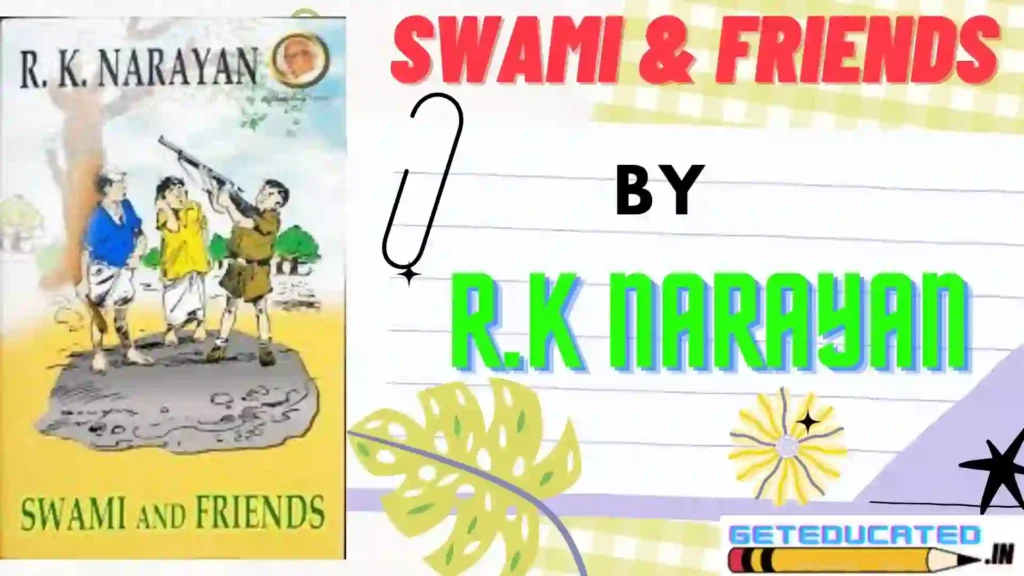
R.K Narayan started his prolific writing career with this novel Swami and Friends written in 1935. It is full of humor and irony. Narayan started writing this novel with the words “It was Monday morning…” to the auspicious time his grandmother chose for him. Like many of his fictional grandmothers, he was close to his grandmother who was well versed with astrology. Despite this it took time for the budding writer to be acknowledged as an author. Fortunately for him, he had helped from many quarters, such as the well-established author British author Graham Green. He called Swami and Friends a work of “remarkable maturity, and of the finest promise….and is the boldest gamble a novelist can take. If he allows himself to take sides, moralise, propaganda, he can easily achieve an extra-literary interest, but if he follows Mr. Narayan’s method, he stakes all on his creative power.”
The novel is set in pre-independence days in India, in a fictional town – Malgudi, which has almost become a real place in India today, due to the wide recognition and popularity of Narayan’s many novels. His novels are known for ‘deftly etched characters, his uniquely stylized language and his wry sense of humor. Swami and Friends is the story of a 10-year-old boy, growing up during this particular time, his innocence, wonder, mischief and growing pains. He is a student at Albert Mission School, a school established by the British which gives importance to Christianity, English literature and education. His life is dramatically changed when Rajam – a symbol of colonial super power – joins the school and he and Rajam become friends.
Swami had a lot of friends but he limited himself to Rajam and Mani. Rajam is the son of the Police Superintendent, and one of Swami’s closest friends. Rajam is new to Swami’s school at the start of the novel, and initially Swami and Mani view him as an enemy due to his quick wits, fine clothes, and fearless nature. He was the guy with an endearing personality. “He (Rajam) was a new-comer; he dressed very well- he was the only boy in class who wore socks and shoes, fur cap and tie, and a wonderful coat and nickers. He spoke very good English, exactly like a European; which meant that few in the school could make out what he said.” The last sentence in the quotation actually runs beyond its literary meaning.
Rajam brought up in a different atmosphere than that of his fellow classmates did in fact speak differently and few understood what he said. Rajam wanted to be better than the rest, to be successful, to impress and to lead. As the novel progresses we see that he is neither affectionate, loyal nor faithful to his friends. At the same time he is confident, intelligent and rarely if ever loses his composure. He has developed the proverbial ‘English stiff upper lip.’ Swami was greatly impressed by Rajam and wanted to be friends with him. And when he finally does so, this friendship initially creates friction between his earlier friends.
Rajam quickly becomes friends with Mani and Swami and acts as their ringleader for the remainder of the novel. Rajam does well in school and is liked by most of his classmates, and he draws confidence from his father’s prominent position although it also causes him to oppose the political activity that his friends support. Rajam sometimes bullies his friends and acquaintances, but more often he unites them and urges them toward new goals, most notably the formation of a cricket team.
Rajam is smarter and grown-up than Mani. He believes in self-respect. He is very sincere in academics. He likes assisting or helping his friends in academics. Mani possesses a propensity for domination amongst every one of his age but Rajam didn’t feel that within him. In fact, Rajam tries to put forward a hand for friendship with Mani. He wanted to settle the enmity with Mani and this signify the nobility Rajam has got with him. He believes in justification of everything with a concrete reason.
Swami liked staying or passing his time with Rajam. Swami and Rajam were not in good terms earlier but after their friendship, Rajam tried his best possible way to assist Swami in all the fields. Swami took him as a kind of motivation as he is the son of police superintendent and he thrives to acquire that kind of lifestyle. Apparently, Rajam is the only boy in Swami’s class who is dressed smartly and speaks English fluently like a European. Since Swami follows Rajam in almost every aspect, he gets the name “The Tail” of Rajam from his classmates.
The turning point in his young life comes when impulsively he decides to join a rebellion against the British. He was however, not being patriotic, but rather impulsive, and was enjoying breaking windowpanes by throwing stones. He is punished harshly by the principal and in a moment of desperation runs away from the school. He is later admitted to another school – Board High School. It is during this time that Rajam, Mani and Swami form a Cricket Club and set a date for a match against another cricket club. Swami is now under pressure by Rajam to attend cricket practices; he skips his drill classes in order to do so, and gets into trouble with the drill teacher. In yet another moment of desperation he runs away both from school and home. He gets lost on the road, but is found by a cart-man and is brought home. He learns that he had indeed missed the cricket match, which he took such pains to practice for.
Rajam stubbornly refuses to see him after this, and after a lapse of some days Swami comes to know through Mani that Rajam’s father was transferred and was moving the next day. Swami is crushed, but in his innocence, he erroneously thinks that Rajam will relent and forgive. Rajam had decided otherwise and hardened himself against forgiving. There is immense poignancy in the parting seen between the friends. It is heightened by the fact that the reader knows that Rajam has not and will not forgive Swami, while Swami believes that he is forgiven and is grieving for his “dearest friend’s” departure: “At the sight of the familiar face Swaminathan lost control of himself and cried: ‘Oh Rajam, Rajam you are going away. When will you come back? Rajam kept looking at him without a word and then (as it seems to Swaminathan) opened his mouth to say something, when everything was disturbed by the guard’s blast and the hoarse whistle of the engine………Rajam’s face with the words still unuttered on his lips, receded”
Swami did not have the money to buy a lavish gift for Rajam, but had thoughtfully decided to give him an English book “Anderson’s Fairy Tales” and writes on the flyleaf To my dearest friend Rajam’. In this last episode Narayan stresses the difference between the thoughtless Rajam and his devoted two friends Swami and Mani. Rajam was ‘dressed like a European boy’, his very appearance was alien to them, but it is not only on the outside that Rajam was different, but even within, as the reader sees through out the novel and especially at the end. To Narayan, Rajam’s ways and thinking are different, much like the “Europeans.” Rajam in his superiority does not feel he owes anybody explanations or farewells. He came, he conquered and he will go as he pleases. This attitude of Rajam’s is akin to that of the colonizer who came, conquered, made drastic changes in the lives of Indians and then left just as abruptly as he had come, leaving chaos behind. Rajam was the symbol of that ‘class of people’ the British colonizer bred, who invariably became alien and even contemptuous to their very own culture.
